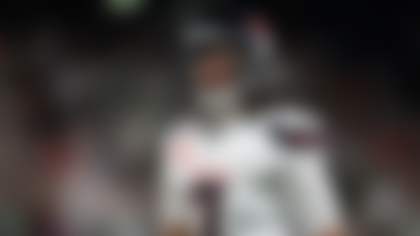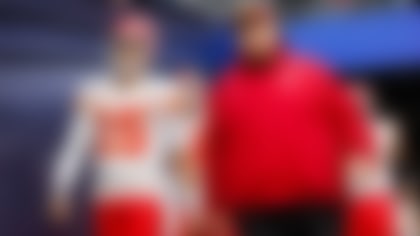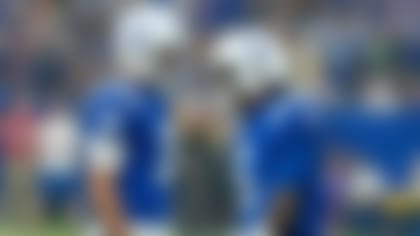Former NFL player and scout Bucky Brooks knows the ins and outs of this league, providing keen insight in his notebook. Today's installment covers:
But first, a look at the contrasting beginnings of the 2024 NFL Draft's top two picks ...
Caleb Williams and Jayden Daniels were the first two players selected in the 2024 NFL Draft back in April. And in the months that followed, a widespread narrative emerged around these two quarterbacks' Year 1 prospects: Williams was entering a good environment in Chicago with solid weaponry and a stout defense, while Daniels could be held back by a rebuilding roster in Washington with a highly suspect offensive line and one of the league's worst defenses.
But three weeks into the 2024 regular season, Caleb and the Bears have struggled to a 1-2 start, while Jayden and the Commanders are tied for first place at 2-1, with the football world raving about the No. 2 overall pick.
With that in mind, I wanted to take a closer look at why Chicago's rookie QB is floundering while Washington's rookie QB is flourishing. Obviously, it's FAR too early to make any kind of declarative statement on either signal-caller, but here are my initial thoughts on both.
What's wrong with Caleb Williams?
It is not Williams' fault that the football world was buzzing about the possibility of the No. 1 overall pick hitting the ground running with a supporting cast featuring a bevy of veteran playmakers (DJ Moore, Keenan Allen, Cole Kmet, Gerald Everett and D'Andre Swift) and a highly touted rookie receiver with potent potential (No. 9 overall pick Rome Odunze). Thoughts of the gifted passer tossing the ball all over the yard to an impressive collection of skill-position talent encouraged some observers to place Chicago among a group of dark-horse contenders. Moreover, it led to speculation that Williams would light up the league from Day 1. While there is still plenty of time for the Bears' new QB1 to find his groove as a professional, the 22-year-old has stumbled out of the gate due to questionable decision-making, accuracy issues and subpar surrounding play.
Heading into Chicago's Week 4 game against the Los Angeles Rams, Caleb's passing numbers leave much to be desired: 59.3 completion percentage, 5.3 yards per attempt, 2:4 touchdown-to-interception ratio, 65.3 passer rating. The rookie has taken 13 sacks, playing at a frantic pace that makes it hard for the offense to sustain any rhythm.
Though improvisation is a big part of Williams' game, the former Oklahoma/USC standout has operated outside of the structure of Chicago's offense for most of his three-game run. He rarely delivers the ball on time and in rhythm, disrupting the flow of a passing game that is supposed to feature more "catch, rock and throw" concepts.
Studying the Bears' first three games, though, Williams is not solely responsible for the passing-game woes. The offensive line has struggled with explosive pass rushers racing around the corner. In addition, the interior three have not consistently provided a solid pocket in front of Williams to allow him to step into his throws.
When the protection has been sturdy, Williams has shown the ability to throw the ball on time and accurately. However, the rookie has routinely fled from clean pockets looking for big gains on scramble tosses. While he has produced an occasional splash play, Williams has made more harmful errors while improvising on the perimeter. The mental miscues and inaccurate throws have stalled drives and kept the Bears from playing efficiently. In addition, the reckless plays have led to turnovers that have flipped the field and changed the game's momentum. Considering these habits were a part of Williams' evaluation as the top quarterback prospect in the 2024 class, the Bears must continue to work with the 2022 Heisman Trophy winner to help him evolve into more of a "manager" at the position.
Offensive coordinator Shane Waldron shares some blame for featuring pass-heavy game plans that have put too much of the offensive burden on Williams' shoulders. With 118 pass attempts, including a whopping 52 in last Sunday's 21-16 loss to the Indianapolis Colts, the young passer has been asked to carry an offense before he fully understands the pro game. Williams' inexperience has led to lapses that have hurt Chicago in critical moments.
While the growing pains are part of the process, Chicago's coaches can assist Caleb in working through his issues by building out game plans that prioritize playing complementary football. With a more conservative approach that relies on the offense, defense and special teams units working together, the Bears can help Williams win games without forcing the newbie to carry the team to victory.
How is Jayden Daniels playing at such a high level?
The story of the 2023 NFL Draft was the Houston Texans striking gold with C.J. Stroud, the second quarterback selected (after Bryce Young) at No. 2 overall. Is history repeating itself in 2024? Like I said above, it'd be grossly premature to come to any sort of conclusion on this front, but clearly, the Commanders are thrilled with the early returns. Daniels is playing like a 10-year vet, exhibiting the poise, confidence and composure to thrive as a franchise quarterback with a unique game.
The 6-foot-4, 210-pounder leads the league with an absurd 80.3 percent completion rate and ranks fifth in passer rating (111.8), guiding an offense that features various quick-rhythm throws designed to swiftly get the ball into the hands of Washington's playmakers on the perimeter. Daniels has operated like a blackjack dealer, delivering pinpoint passes to perimeter pass catchers on various catch-and-run concepts created by Air Raid guru Kliff Kingsbury. The former Arizona Cardinals head man and experienced college coach has crafted a scheme that enables Daniels to play to his strengths as a rhythm passer while tapping into the 2023 Heisman Trophy winner's explosive running ability. As a result, Washington has now scored points on 14 consecutive drives (excluding kneel-downs) and remains the only NFL team without a single turnover this season.
Daniels' superb ball security has instantly helped the Commanders become a tougher out. Washington, which finished last season with the fourth-most turnovers (32), is not helping opponents with extra possessions or short fields, which makes a huge difference in a league where most games are decided by eight points or fewer.
In addition, the rookie's exceptional efficiency as a passer and spectacular overall playmaking skills have added a dimension to an offense that lacked pizzazz before his arrival. The Commanders can torch opponents with a barrage of rhythm passes from Daniels directed to all areas of the field at short, intermediate and deep range, or unleash their first-year quarterback on designed runs and scrambles that force opposing play-callers to tweak their game plans to account for an extra runner in the backfield. Here's from the Washington Post: With 15 rushing first downs through three games, Daniels tied Cam Newton (2015 and 2020) for the second-most rushing first downs by a quarterback through three games. (Daunte Culpepper's the all-time leader, with 16 in 2000.) Considering how a mobile quarterback can enhance a ground attack, it is not a surprise the Commanders rank fifth in rushing yards per game (153.7).
With Washington's ability to lean on the rushing attack to control the game, Daniels has kept the offense on schedule, allowing him to operate in attack mode. As a deadly, accurate passer with exceptional arm talent, he has taken advantage of favorable looks and high-percentage throws that punish opponents for overaggressive tactics or soft coverage.
In this past Monday night's 38-33 win over the Cincinnati Bengals, in particular, Daniels torched the defense on blitzes that exposed the secondary to one-on-one coverage against Terry McLaurin. The 23-year-old repeatedly cashed in with pinpoint throws that resulted in a touchdown or first down. With Daniels unfazed by heavy pressure from opponents attempting to force him into a mistake, the Commanders have been able to take full advantage of these opportunities.
In a league where points are coveted at a premium, Daniels' talent and temperament have helped Washington field a potent offense by attacking pressure with timely throws and runs. Perhaps his extensive experience as a collegian (55 career starts) prepped him for his role, thanks to the countless practice and game reps at Arizona State and LSU. Despite moving up a level, he appears to see the game in slow motion.
Moreover, the experience and emotional maturity Jayden has displayed as a rookie has helped him quickly get on the same page with a veteran crew of playmakers (guys like McLaurin, Zach Ertz and Austin Ekeler) who possess the high football IQ to bail out the young quarterback when necessary.
In addition to Kingsbury, head coach Dan Quinn and general manager Adam Peters deserve credit for creating an environment that has allowed Daniels to thrive from Day 1.
How Brian Flores' D scrambles QBs
Sam Darnold, Kevin O'Connell and the Vikings' offense deserve plenty of credit for Minnesota's 3-0 start -- but it would be an understatement to say the defense has held up its end of the bargain, yielding the second-fewest points per game in the NFL (10.0) while leading the league in sacks (16) and tying for second in interceptions (five).
Though defensive coordinator Brian Flores' scheme appears haphazard at first glance, he has masterfully crafted it to match the talents of his players, showcasing their veteran experience and superior intelligence while using exotic tactics to befuddle offensive play-callers and quarterbacks. In fact, some of those opposing QBs were so impressed, they on Flores for his creativity.
Over the past few weeks, Pro Bowl quarterbacks Brock Purdy (six sacks taken and an interception) and C.J. Stroud (two interceptions, four sacks taken and a 68.6 passer rating) struggled mightily in key matchups against Flores' squad. Now, with the Vikings heading to Green Bay to take on the Packers -- themselves the winners of two straight -- in a crucial NFC North showdown, this is the perfect time to study Flores' approach and the system that is leaving passers dazed and confused around the league.
Before we delve into the details, though, it is important to understand Flores' mentality. Going back to his time as a Patriots assistant and the Dolphins' head coach, he's shown himself to be an aggressive play-caller who utilizes deception and pre-snap disguise to mix all-out pressures with soft zones. As a former secondary coach with a keen understanding of coverage and the impact of pre- and post-snap movement, Flores challenges quarterbacks to make quick decisions while deciphering pressure and coverage on the move. He wants to ramp up the quarterback's urgency with all-out-pressure looks; then he varies six- and seven-man pressures with "eyes" zone coverage behind them, or he falls back into seven- and eight-man coverages, with defenders deployed in unique alignments.
Flores' clever "bluff and bail" schemes put QBs under mental and physical stress, and they eventually commit mistakes and miscues, thanks to their inability to consistently determine whether to target hot routes or execute the full progression against Flores' amoeba coverage (think of the used by former Syracuse men's basketball coach Jim Boeheim). Extensive postgame study is required to understand what the Vikings played throughout a contest.
Flores ' scheme emphasizes the effective utilization of "hot" or "eyes" coverage, a tactic that he borrowed from the college game and tweaked for the pros. Six defenders are sent after the quarterback, and five defenders are kept in coverage; instead of playing an assigned man, the defenders in coverage keep their eyes affixed to the opposing passer.
At the collegiate level, some teams will utilize a "three-deep, two under" (three deep defenders with two underneath droppers) coverage. The Vikings, however, have mixed in some quarters coverage tactics with "two-to-one" reads (in which the corners and safeties read the slot receiver to determine whether to play deep or short) behind their all-out pressures, to eliminate vertical throws and quick passes to the flats. Mixed with some of the "read" pressure tactics that were a hallmark of Flores' Miami defenses, the coverage keeps quarterbacks guessing. It also shrinks the number of plays and passing concepts his defenders must prepare for, with the blitz forcing quick throws. As a result, opponents have to play with smaller menus against a defense that constantly increases the pressure once it determines how the opponents want to attack.
The Vikings' defensive lineup features several pass-rushing specialists (Jonathan Greenard, Andrew Van Ginkel, Dallas Turner and Pat Jones) with diverse games. Flores' creative tactics enable him to get free runners to the quarterback, with the offensive line unable to decipher who is coming on any given play. As more second-level defenders are added to the pressure package, the Vikings will continue to keep quarterbacks guessing when the ball is snapped.
Minnesota will further adapt and evolve its coverage around the unique six-man pressures Flores employs -- and opposing offensive coordinators will be hard-pressed to counter the mental and physical challenge.












